Abstract
BACKGROUND AND AIMS: Colorectal cancer screening beginning at age 50 is recommended for all Americans considered at average risk for the development of colorectal cancer regardless of gender or race/ethnicity. We determined the influence of gender and race/ethnicity on the cost-effectiveness of recommended colorectal cancer screening regimens. METHODS: We determined age-specific colorectal cancer incidence rates; the proportion of left-sided cancers; and the proportion of localized cancers in Asian, black, Latino and white men and women using the California Cancer Registry. We incorporated these data and available data for life expectancy and colorectal cancer survival to model the cost-effectiveness of two 35-year colorectal cancer-screening interventions. RESULTS: Age-specific colorectal cancer incidence rates were highest in black men and lowest in Latino women. Screening beginning at age 50 was most cost-effective in black men and least cost-effective in Latino women (measured as dollars spent per year of life saved) using annual fecal occult blood testing combined with flexible sigmoidoscopy every five years and using colonoscopy every 10 years. The cost-effectiveness of a 35-year screening program in black men beginning at age 45 was similar to the cost-effectiveness of screening white men and black women beginning at age 50 and more cost-effective than screening nonblack women as well as Asian and Latino men beginning at age 50. CONCLUSIONS: Screening is most cost-effective in black men because of high age-specific colorectal cancer incidence rates. Initiation of colorectal cancer screening in this high-risk group prior to age 50 should be strongly considered.
Full text
PDF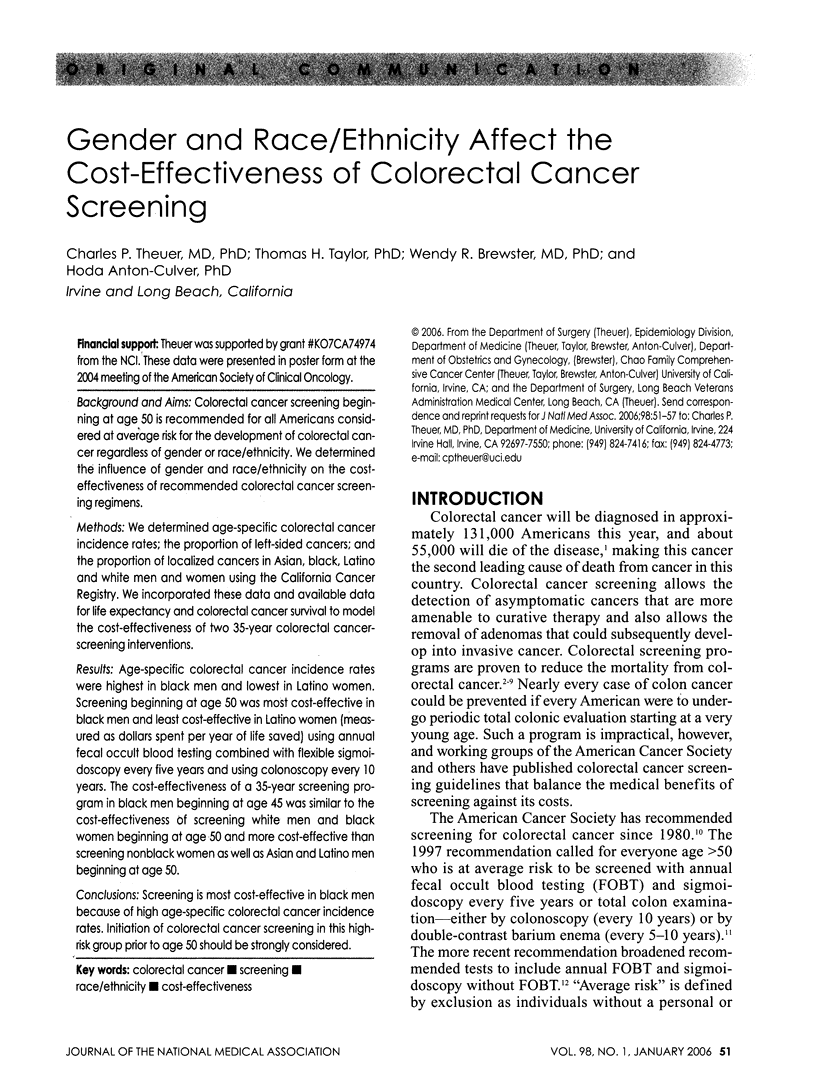
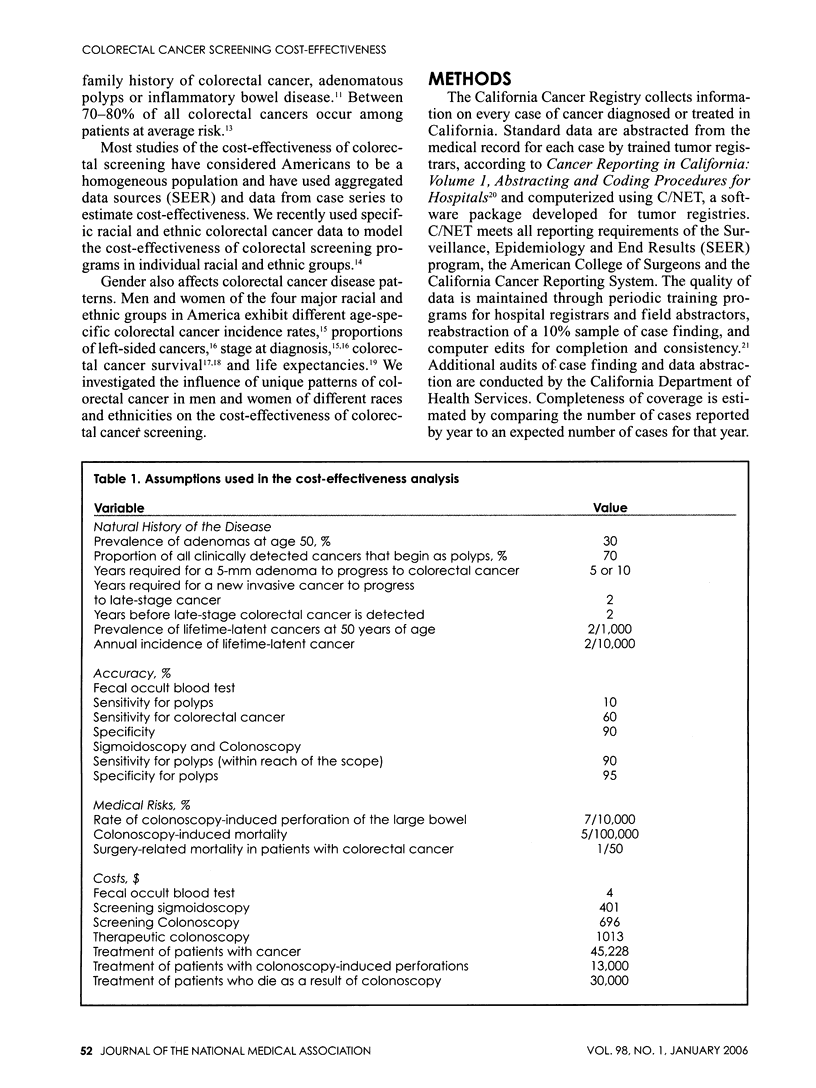
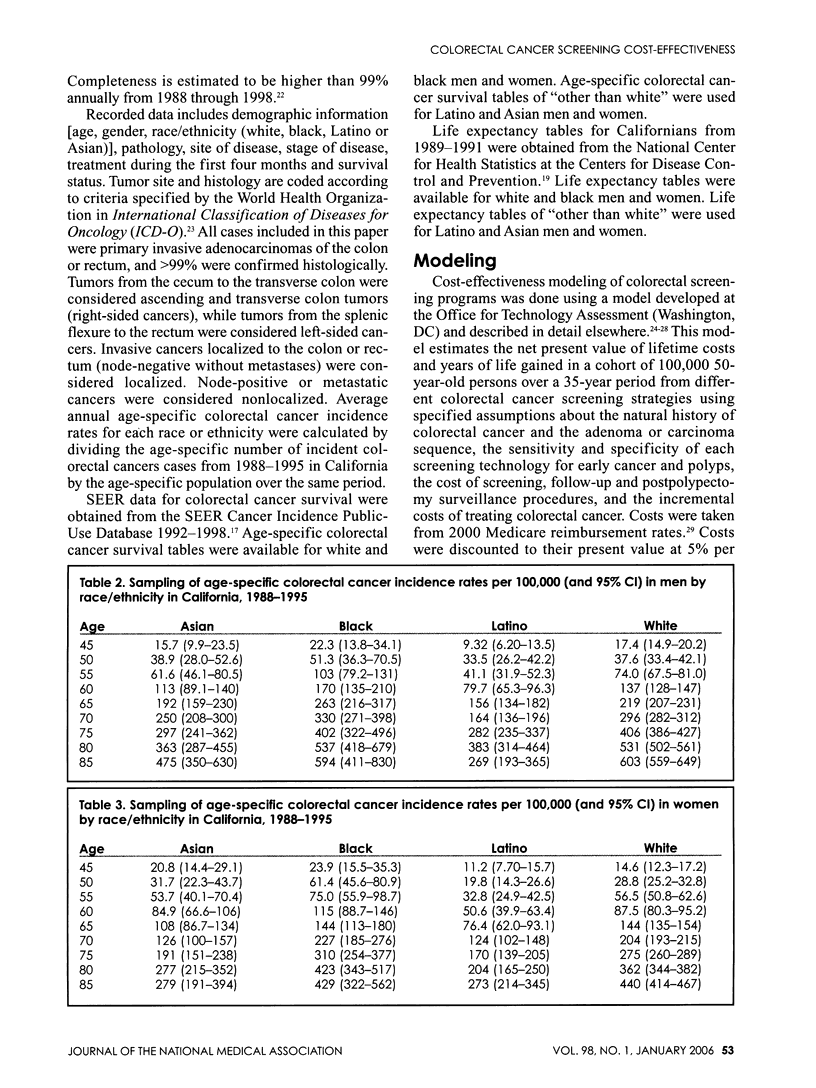
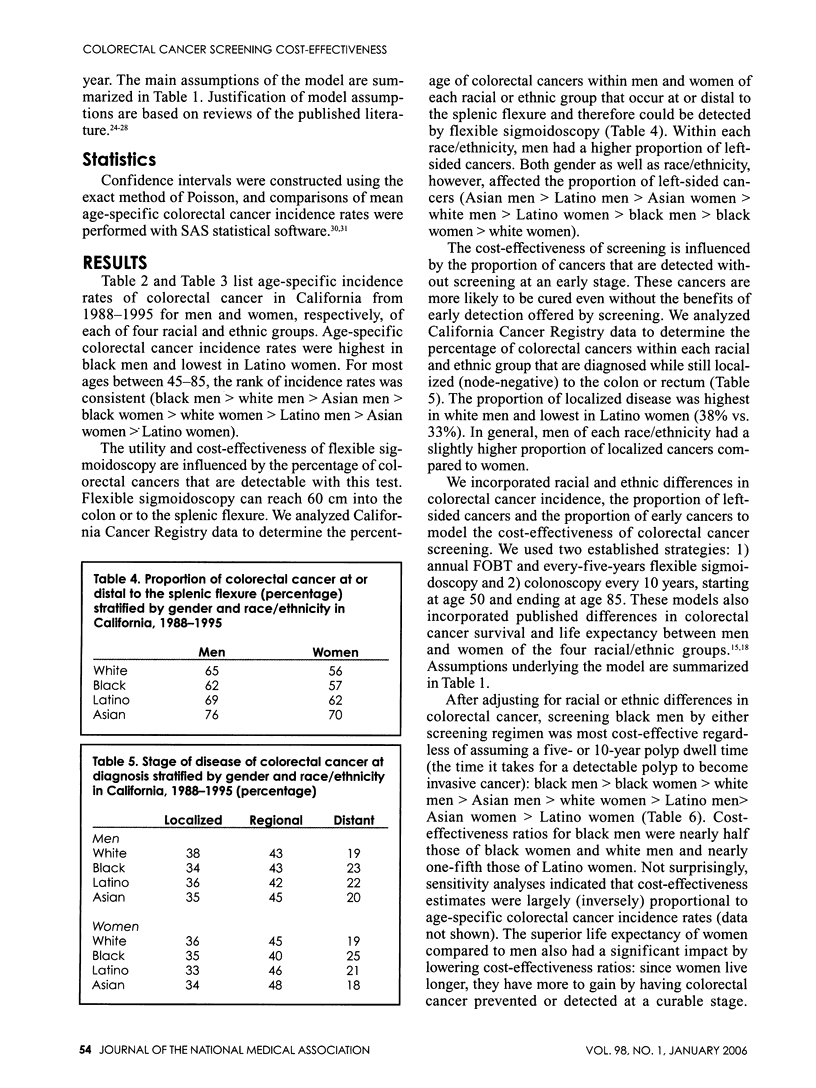
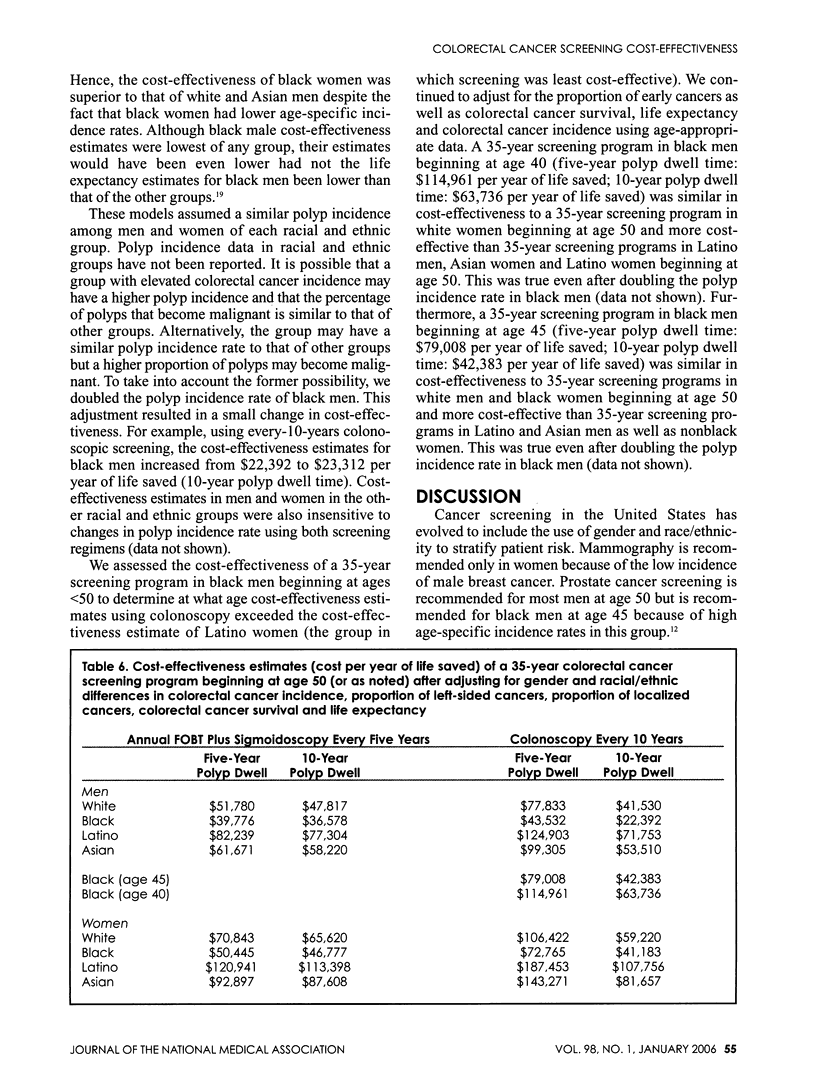
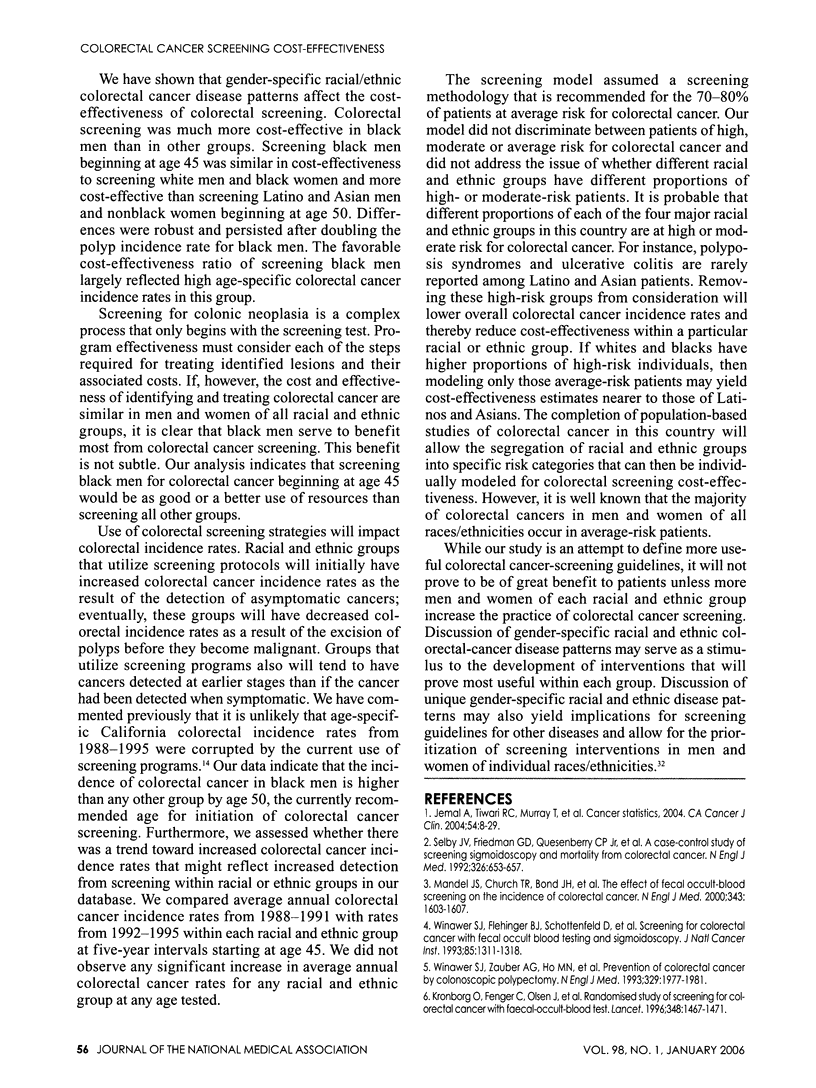
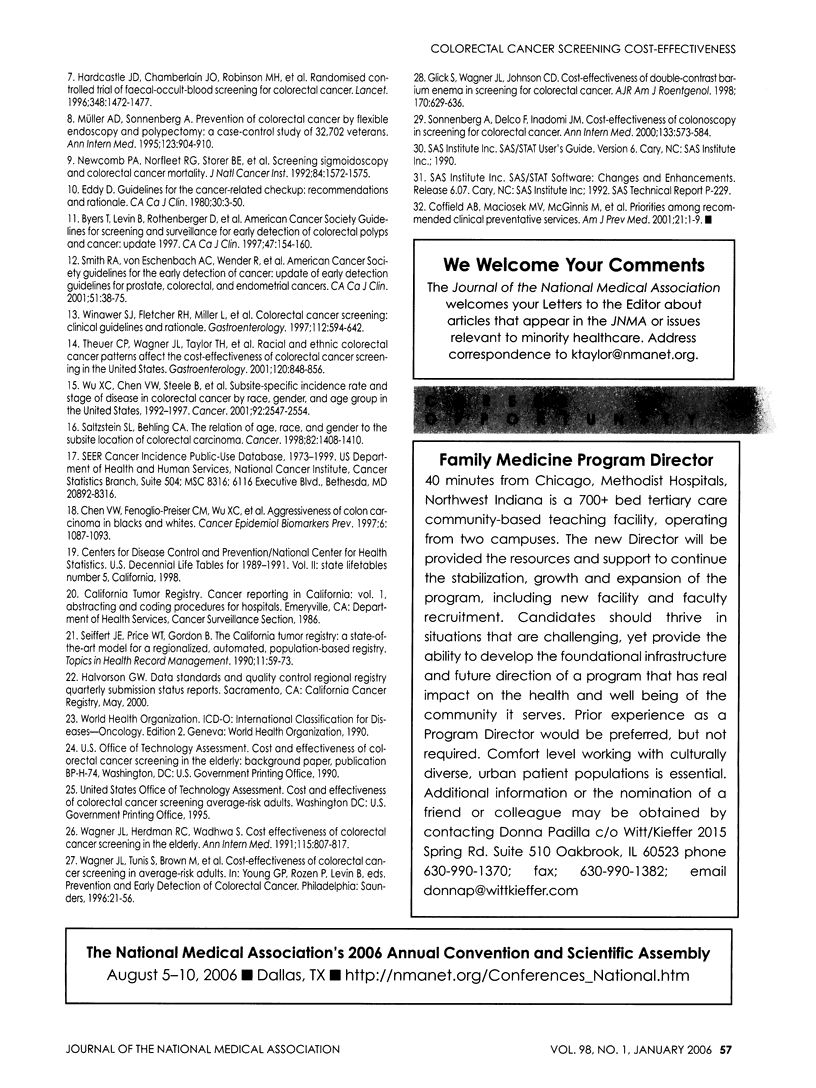
Selected References
These references are in PubMed. This may not be the complete list of references from this article.
- Byers T., Levin B., Rothenberger D., Dodd G. D., Smith R. A. American Cancer Society guidelines for screening and surveillance for early detection of colorectal polyps and cancer: update 1997. American Cancer Society Detection and Treatment Advisory Group on Colorectal Cancer. CA Cancer J Clin. 1997 May-Jun;47(3):154–160. doi: 10.3322/canjclin.47.3.154. [DOI] [PubMed] [Google Scholar]
- Chen V. W., Fenoglio-Preiser C. M., Wu X. C., Coates R. J., Reynolds P., Wickerham D. L., Andrews P., Hunter C., Stemmermann G., Jackson J. S. Aggressiveness of colon carcinoma in blacks and whites. National Cancer Institute Black/White Cancer Survival Study Group. Cancer Epidemiol Biomarkers Prev. 1997 Dec;6(12):1087–1093. [PubMed] [Google Scholar]
- Cheng X., Chen V. W., Steele B., Ruiz B., Fulton J., Liu L., Carozza S. E., Greenlee R. Subsite-specific incidence rate and stage of disease in colorectal cancer by race, gender, and age group in the United States, 1992-1997. Cancer. 2001 Nov 15;92(10):2547–2554. doi: 10.1002/1097-0142(20011115)92:10<2547::aid-cncr1606>3.0.co;2-k. [DOI] [PubMed] [Google Scholar]
- Glick S., Wagner J. L., Johnson C. D. Cost-effectiveness of double-contrast barium enema in screening for colorectal cancer. AJR Am J Roentgenol. 1998 Mar;170(3):629–636. doi: 10.2214/ajr.170.3.9490943. [DOI] [PubMed] [Google Scholar]
- Hardcastle J. D., Chamberlain J. O., Robinson M. H., Moss S. M., Amar S. S., Balfour T. W., James P. D., Mangham C. M. Randomised controlled trial of faecal-occult-blood screening for colorectal cancer. Lancet. 1996 Nov 30;348(9040):1472–1477. doi: 10.1016/S0140-6736(96)03386-7. [DOI] [PubMed] [Google Scholar]
- Jemal Ahmedin, Tiwari Ram C., Murray Taylor, Ghafoor Asma, Samuels Alicia, Ward Elizabeth, Feuer Eric J., Thun Michael J., American Cancer Society Cancer statistics, 2004. CA Cancer J Clin. 2004 Jan-Feb;54(1):8–29. doi: 10.3322/canjclin.54.1.8. [DOI] [PubMed] [Google Scholar]
- Kronborg O., Fenger C., Olsen J., Jørgensen O. D., Søndergaard O. Randomised study of screening for colorectal cancer with faecal-occult-blood test. Lancet. 1996 Nov 30;348(9040):1467–1471. doi: 10.1016/S0140-6736(96)03430-7. [DOI] [PubMed] [Google Scholar]
- Mandel J. S., Church T. R., Bond J. H., Ederer F., Geisser M. S., Mongin S. J., Snover D. C., Schuman L. M. The effect of fecal occult-blood screening on the incidence of colorectal cancer. N Engl J Med. 2000 Nov 30;343(22):1603–1607. doi: 10.1056/NEJM200011303432203. [DOI] [PubMed] [Google Scholar]
- Müller A. D., Sonnenberg A. Prevention of colorectal cancer by flexible endoscopy and polypectomy. A case-control study of 32,702 veterans. Ann Intern Med. 1995 Dec 15;123(12):904–910. doi: 10.7326/0003-4819-123-12-199512150-00002. [DOI] [PubMed] [Google Scholar]
- Newcomb P. A., Norfleet R. G., Storer B. E., Surawicz T. S., Marcus P. M. Screening sigmoidoscopy and colorectal cancer mortality. J Natl Cancer Inst. 1992 Oct 21;84(20):1572–1575. doi: 10.1093/jnci/84.20.1572. [DOI] [PubMed] [Google Scholar]
- Saltzstein S. L., Behling C. A., Savides T. J. The relation of age, race, and gender to the subsite location of colorectal carcinoma. Cancer. 1998 Apr 1;82(7):1408–1410. doi: 10.1002/(sici)1097-0142(19980401)82:7<1408::aid-cncr28>3.0.co;2-9. [DOI] [PubMed] [Google Scholar]
- Seiffert J. E., Price W. T., Gordon B. The California tumor registry: a state-of-the-art model for a regionalized, automated, population-based registry. Top Health Rec Manage. 1990 Dec;11(2):59–73. [PubMed] [Google Scholar]
- Selby J. V., Friedman G. D., Quesenberry C. P., Jr, Weiss N. S. A case-control study of screening sigmoidoscopy and mortality from colorectal cancer. N Engl J Med. 1992 Mar 5;326(10):653–657. doi: 10.1056/NEJM199203053261001. [DOI] [PubMed] [Google Scholar]
- Smith R. A., von Eschenbach A. C., Wender R., Levin B., Byers T., Rothenberger D., Brooks D., Creasman W., Cohen C., Runowicz C. American Cancer Society guidelines for the early detection of cancer: update of early detection guidelines for prostate, colorectal, and endometrial cancers. Also: update 2001--testing for early lung cancer detection. CA Cancer J Clin. 2001 Jan-Feb;51(1):38–80. doi: 10.3322/canjclin.51.1.38. [DOI] [PubMed] [Google Scholar]
- Sonnenberg A., Delcò F., Inadomi J. M. Cost-effectiveness of colonoscopy in screening for colorectal cancer. Ann Intern Med. 2000 Oct 17;133(8):573–584. doi: 10.7326/0003-4819-133-8-200010170-00007. [DOI] [PubMed] [Google Scholar]
- Theuer C. P., Wagner J. L., Taylor T. H., Brewster W. R., Tran D., McLaren C. E., Anton-Culver H. Racial and ethnic colorectal cancer patterns affect the cost-effectiveness of colorectal cancer screening in the United States. Gastroenterology. 2001 Mar;120(4):848–856. doi: 10.1053/gast.2001.22535. [DOI] [PubMed] [Google Scholar]
- Wagner J. L., Herdman R. C., Wadhwa S. Cost effectiveness of colorectal cancer screening in the elderly. Ann Intern Med. 1991 Nov 15;115(10):807–817. doi: 10.7326/0003-4819-115-10-807. [DOI] [PubMed] [Google Scholar]
- Winawer S. J., Flehinger B. J., Schottenfeld D., Miller D. G. Screening for colorectal cancer with fecal occult blood testing and sigmoidoscopy. J Natl Cancer Inst. 1993 Aug 18;85(16):1311–1318. doi: 10.1093/jnci/85.16.1311. [DOI] [PubMed] [Google Scholar]
- Winawer S. J., Fletcher R. H., Miller L., Godlee F., Stolar M. H., Mulrow C. D., Woolf S. H., Glick S. N., Ganiats T. G., Bond J. H. Colorectal cancer screening: clinical guidelines and rationale. Gastroenterology. 1997 Feb;112(2):594–642. doi: 10.1053/gast.1997.v112.agast970594. [DOI] [PubMed] [Google Scholar]
- Winawer S. J., Zauber A. G., Ho M. N., O'Brien M. J., Gottlieb L. S., Sternberg S. S., Waye J. D., Schapiro M., Bond J. H., Panish J. F. Prevention of colorectal cancer by colonoscopic polypectomy. The National Polyp Study Workgroup. N Engl J Med. 1993 Dec 30;329(27):1977–1981. doi: 10.1056/NEJM199312303292701. [DOI] [PubMed] [Google Scholar]


